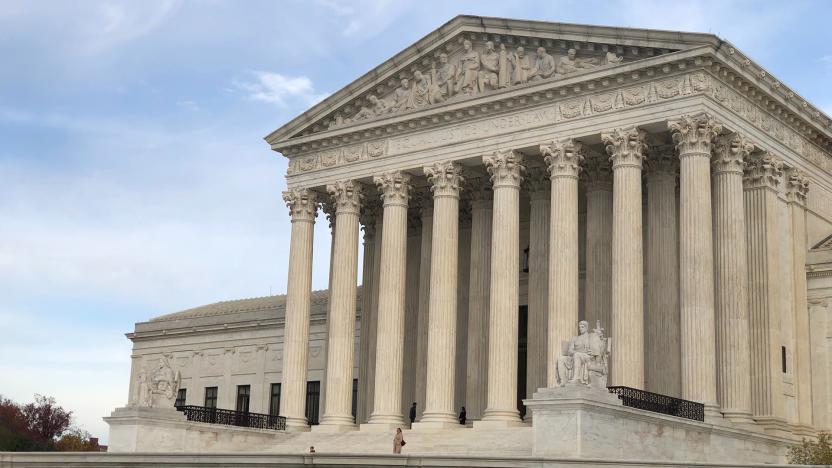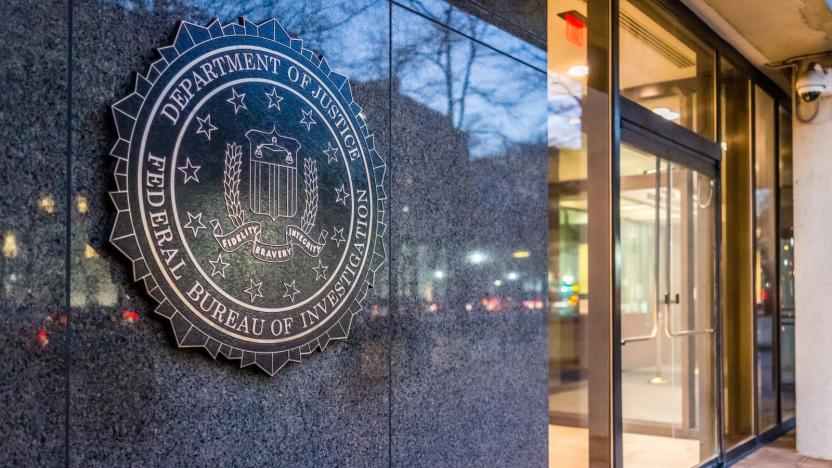constitution
Latest

Anthropic explains how Claude's AI constitution protects it against adversarial inputs
Anthropic explains how binding its Claude AI to a set of guiding principles will lead to better outputs and prevent racist meltdowns.

Florida asks Supreme Court to decide fight over social media regulation
Florida has petitioned the Supreme Court to rule on whether states can make social media platforms host speech.

The Treasury Department is buying sensitive app data for investigations
The Treasury Department has bought sensitive app data for investigations, possibly bypassing due process.

Supreme Court asked to review case against border device searches
The ACLU and EFF have asked the Supreme Court to hear a challenge against warrantless phone and laptop searches at borders, including airports.

Court rejects Trump's ongoing fight to block critics on Twitter
President Trump's attempt to overturn a ruling that prevents him from blocking Twitter critics has been shot down -- at least for now. An appeals court has denied the Trump administration's request for a review of the decision after a majority of judges decided a review wasn't necessary. Circuit Judge Barrington Parker described the original decision as a "straightforward application" of existing actions and precedent. If Trump is going to use his personal Twitter account for official statements (and he does), that account becomes a public forum where critics are allowed to voice their disagreements.

Court reinstates lawsuit challenging online sex trafficking law
Civil liberty advocates are getting a second chance to challenge the legitimacy of the FOSTA-SESTA online sex trafficking law. An appeals court has reinstated a lawsuit claiming that FOSTA-SESTA violates First Amendment protections for free speech. While a judge had previously tossed the lawsuit on the grounds that plaintiffs Alex Andrews and Eric Koszyk didn't face a credible threat of prosecution, the appeals court disagreed. It determined that Andrews faced a real threat due to her sex worker support site, while FOSTA may have harmed Koszyk by denying him the ability to offer therapeutic massages anywhere on Craigslist.

Wikipedia comes back online in Turkey after multi-year ban
Access to Wikipedia in Turkey has been restored after a nearly three-year ban, which saw the site blocked after it refused to remove content tying the country to terrorist groups. The ban, which was imposed by Turkey in April 2017, came about after it concluded that Wikipedia was running a "smear campaign" against the government. It subsequently leveraged a law that permits the banning of any website deemed a national security threat.

Pennsylvania court rules suspect can't be forced to provide his password
Law enforcment might soon have a harder time forcing suspects to unlock their devices. Pennsylvania's Supreme Court has ruled that authorities were asking Joseph J. Davis, the accused in a child pornography case, to violate his Fifth Amendment right against self-incrimination when they asked him to provide the password for his computer. A lower court had determined that the request fell under an exemption to the Fifth Amendment when Davis seemingly acknowledged the presence of child porn on his PC, but the state Supreme Court rejected that argument on the grounds that a password is testimony and thus protected under the Constitution.

Federal judge rules suspicionless device searches at the border are illegal
Civil liberties advocates just scored an important victory in a bid to prevent arbitrary device searches at the US border. A federal court handling a 2017 lawsuit has ruled that US policies allowing device searches without valid suspicion or warrants violate Fourth Amendment protections against unreasonable searches and seizures. Judge Denise Casper noted that an exemption for searches at the border was "not limitless," and still needed to strike a balance between privacy and government interests. That usually means focusing on contraband, she said.

FISA court: FBI use of NSA's electronic surveillance data was illegal
A US court ruled that some of the FBI's electronic surveillance activities violated the constitutional privacy rights of Americans. The Foreign Intelligence Surveillance Court (FISC) deemed that FBI officials improperly searched a National Security Agency (NSA) intelligence database for info on Americans. The ruling was made last year but just revealed by the intelligence community today.

Donald Trump really wants to be allowed to block people on Twitter
If there's one thing President Donald Trump has made clear during his time in office so far, it's that he's a big fan of Twitter. And that includes -- as recent legal battles demonstrate -- blocking users that disagree with his views. And even though last month a federal judge ruled that doing this constituted a violation of the First Amendment, it seems it's a pretty important feature for Trump, as the US Justice Department now says it will appeal that ruling.

Judge dismisses Kaspersky lawsuits over government ban
Last year, the US government made moves to ban the use of Kaspersky security software in federal agencies, claiming the company's ties to the Russian government represented a security risk. In September, the Department of Homeland Security issued an order that required federal departments and agencies to remove the company's software from their systems. Then, Congress passed and President Trump approved a bill -- the National Defense Authorization Act (NDAA) -- that also banned Kaspersky software from federal government use. Kaspersky subsequently filed two lawsuits combatting both bans, but a judge has now dismissed them.

Court rules Stingray use without a warrant violates Fourth Amendment
Today, the Washington DC Court of Appeals overturned a Superior Court conviction of a man who was located by police using a cell-site simulator, or Stingray, CBS News reports. The court ruled that the defendant's Fourth Amendment rights were violated when law enforcement tracked down the suspect using his own cell phone without a warrant.

Email Privacy Act has another run at becoming law
If the definition of madness is doing the same thing and expecting different results, someone should check in on the Email Privacy Act. The bill is taking its third run at becoming law after failing to pass the house in 2013 and the senate in 2016. Reuters reports that the bill was waved through congress but faces a difficult time of it in the Senate.

New York lawsuit aims to apply the Second Amendment to Tasers
The Firearms Policy Foundation and Matthew Avitabile are suing New York state over a regulation that outlaws the possession of electronic weapons including stun guns and Tasers. Avitabile happens to be the mayor of Middleburgh, New York, and he wants to buy a Taser or stun gun for his home, according to court documents filed over the weekend. His lawyers argue that the New York ban on owning stun guns is unconstitutional, violating the Second Amendment right to keep and bear arms.

Airbnb claims Santa Monica ban violates the Constitution
Airbnb isn't done with lawsuits over home rental laws it doesn't like -- not by a long shot. It's suing Santa Monica over municipal code that effectively bans "vacation rental" services through severe restrictions (you have to be home and obtain a business license, for example) and reporting requirements. For one thing, it claims that the rules violate multiple aspects of the US Constitution. They're allegedly a violation of free speech by dictating what content people can publish. Airbnb also claims that they infringe on search and seizure rights (and the Stored Communications Act) by requiring the disclosure of sensitive customer info without legal procedures, and tread on due process rights because they're both "vague" and don't notify you of potential lawbreaking.

The copy of the U.S. Constitution that's installed on every Mac
Sometimes when I see just how ignorant many American politicians are of the Constitution of the United States, I get the urge to send them a copy along with some annotations. Perhaps now that more of those in the federal government are using Macs, we might begin to see them paying more attention to this document that outlines the supreme law of the land. Why? Well, there's a copy of the U.S. Constitution on each and every Mac in the Dictionary app. To see this information from The New Oxford American Dictionary, just launch the Dictionary app from your Applications folder. Once it's up and running, go up to the menu bar and select Go > Front/Back Matter. There you'll not only find such exciting information as who was on the editorial staff and advisory board for the Dictionary, but also a bunch of useful references. In addition to the aforementioned Constitution of the United States of America, there's also a complete Language Guide, a history of the English language, a list of the fifty states and each state capital, a list of every President of the U.S. from George Washington to George W. Bush (not sure what happened to the current incumbent...), the Declaration of Independence, a list of countries of the world, a list of chemical elements from hydrogen to meitnerium, a cross-reference of standard to metric measure conversions, and the Arabic, Hebrew, Greek and Russian alphabets. Sure, it's not exactly Wikipedia, but it's sure nice to know that if you're offline and just happen to need to know what the 21st Amendment to the Constitution did (it repealed Prohibition), you've got it at your fingertips.

Google launches Constitute, a tool for creating and comparing governments (video)
Countries frequently amend or draft constitutions, but they can't always find example constitutions to work from -- not every country publishes its founding documents in accessible formats. So, Google's simplifying nation building by launching Constitute, a website that puts all the world's constitutions in one place. The tool indexes both basic details as well as policies. It's easy to filter charters by their creation date, for example, or to find countries that protect equality based on gender. Whether you're forming a government or just like to dabble in political science, you can try Constitute at the source link.

New Jersey now requires search warrants for cellphone location data
For all the worries about sweeping US surveillance programs, Americans are claiming at least a few victories in the fight for privacy. Just look to New Jersey's Supreme Court for an example -- it has ruled that police need search warrants to obtain tracking information from cellular carriers. Citing a ruling that requires warrants for GPS tracking devices, the court has decided that attempts to obtain cellphone location data represent searches and fall under constitutional oversight. Cellphone users can expect a reasonable level of privacy when they sign up for service, according to the Supreme Court. While there's no law on the books to restrict tracking, like there is in Montana, the ruling sets a precedent for police monitoring that could extend beyond New Jersey's borders. [Image credit: Jeff Schuler, Flickr]

Authorities decrypt laptop without defendant's help, Fifth Amendment need not apply
Constitutional junkies have had their eyes on Colorado for awhile now, because a federal judge there ordered a woman to decrypt her hard drive in a criminal trial. This, despite her cries that doing so would violate her Fifth Amendment right to be free from self-incrimination. The argument is now moot, as authorities have managed to access the laptop's data without any aid from the defendant, thereby obviating any Constitutional conundrums. Who knows if the feds found the evidence of bank-fraud they were looking for, or whether it was brute force or a lucky guess that did the trick, but at least we can say it's the last of the laptop-related Fifth Amendment court cases for awhile, right?








